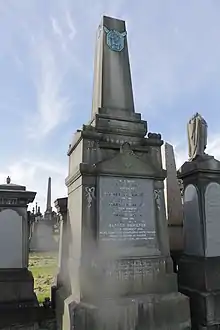Charles Connell and Company
Charles Connell and Company was a Scottish shipbuilding company based in Scotstoun in Glasgow on the River Clyde.
| Type | Private |
|---|---|
| Industry | Shipbuilding |
| Founded | 1861 |
| Defunct | 1980 |
| Fate | Closed |
| Successor | Scotstoun Marine Ltd (1972–1980) |
| Headquarters | Scotstoun, Glasgow, Scotland |
| Parent | Upper Clyde Shipbuilders (1968–1971) Govan Shipbuilders (1972–1980) |

History
The company was founded by Charles Connell (1822–1894) who had served an apprenticeship with Robert Steele and Co before becoming manager of Alexander Stephen and Sons Kelvinhaugh yard before he started shipbuilding on his own account at Scotstoun in 1861 initially concentrating on sailing ships.[1]
From 1918 the Company became well known for high quality passenger and cargo ships. The yard closed from 1930 to 1937 due to the Great Depression, before rearmament efforts stimulated demand.
In 1968 the yard passed from Connell family ownership after 107 years and became part of Upper Clyde Shipbuilders.[2]
The Scotstoun yard continued to be operated by Upper Clyde Shipbuilders until 1971, when the company collapsed[3] and, from 1972 to 1980, by Scotstoun Marine Ltd, a subsidiary of Govan Shipbuilders.
The Connell shipyard was closed in 1980 after 119 years of shipbuilding. The site was cleared of cranes although some evidence of the building berths remained visible until about 2004. Part of the yard's covered facilities are used by steel stockholders GKN whilst the riverside berth has been used by Motherwell Bridge Engineering[4] for heavy fabrication work.
Ships built
Connells built a total of 516 ships at Scotstoun. They include:
- Wild Deer (1863) – composite clipper ship
- Michael Angelo (clipper) (1865) – sailing clipper[5]
- Taitsing (1865) — sailing clipper
- Spindrift (1867) – composite clipper ship
- Loch Ard (1873) — sailing ship
- SS City of Agra (1879) – cargo steamer
- Balclutha (1886) — iron-hulled sailing ship, preserved at the San Francisco Maritime Museum
- Mersey (1894) — iron-hulled sailing ship
- Knight Errant (1897) – cargo ship
- Saturnia (1910) – passenger steamship[6]
- Acacia-class sloops HMS Jonquil (1915) and HMS Laburnum (1915)
- Arabis-class sloops HMS Gladiolus (1915), HMS Godetia (1916) and HMS Hydrangea (1916)
- P-class sloops HMS P.14 (1916) and HMS P.63 (1916)
- SS Clan Skene (1919)[7]
- SS Diplomat (1921)[8]
- SS Traveller (1922)[9]
- SS Auditor (1924)[10]
- SS Benvenue (1927)[11]
- SS Benmohr (1928)[12]
- SS Benwyvis (1929)[13]
- SS Traprain Law (1930)[14]
- SS Rothermere (1938)[15]
- SS Narwik (1942) — Polish Empire B class cargo steamship[16]
- Empire Celia (1943) — MoWT cargo steamship
- Purnea (1947) – passenger-cargo ship
References
- Royal Commission on Ancient & Historical Monuments of Scotland
- Government's shipbuilding crisis BBC News, 1 January 2002
- Parliamentary debates Hansard, 4 June 1971
- Motherwell Bridge Engineering
- http://freepages.genealogy.rootsweb.ancestry.com/~nzbound/michaelangelo1873.htm
- "Saturnia". Clydeships. Retrieved 7 November 2019.
- "Clan Skene". uboat.net. Retrieved 28 March 2022.
- "Diplomat". uboat.net. Retrieved 21 March 2021.
- "Traveller". uboat.net. Retrieved 16 November 2021.
- "Auditor". uboat.net. Retrieved 27 June 2021.
- "Benvenue". uboat.net. Retrieved 29 May 2021.
- "Benmohr". uboat.net. Retrieved 5 January 2022.
- "Benwyvis". uboat.net. Retrieved 3 May 2021.
- "Esmond". uboat.net. Retrieved 27 May 2021.
- "Rothermere". uboat.net. Retrieved 2 June 2021.
- Miciński, Jerzy; Huras, Bohdan; Twardowski, Marek (1999). Księga statków polskich 1918–1945. Tom 3 [A book of Polish ships 1918–1945. Vol. 3] (in Polish). Gdańsk: Polnord Wydawnictwo Oskar. p. 317. ISBN 83-86181-45-1.
